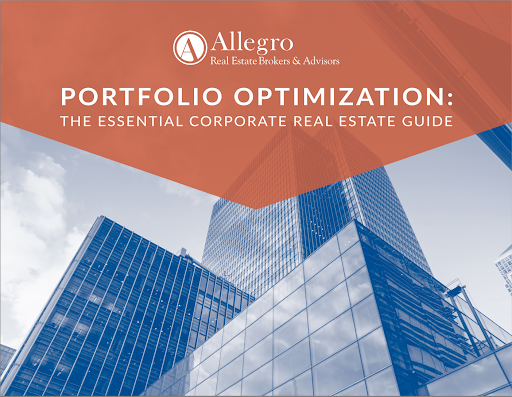When a company finds itself facing higher production demands or customers in new geographical areas, it’s common for business leaders to expand their company’s commercial real estate portfolio.
Portfolio growth can be influenced by many different factors. Regardless of the situation, however, the responsibilities associated with an expanded portfolio often fall to the company’s director of real estate.
This post will cover seven critical functions of a real estate director for a multi-location portfolio and best practices for success in each.
7 Core Functions of a Director of Commercial Real Estate
1. Commercial Real Estate Portfolio Strategy
An effective portfolio optimization strategy aligns a company’s real estate goals with their organizational goals. When implemented successfully, CRE strategy allows for efficient operations, impactful branding opportunities, and strong financial results.
As a director of real estate, revisit your CRE optimization strategy often to ensure properties and goals are still in alignment.
CRE Portfolio Strategy Best Practices for Directors of Real Estate
To maximize the impact of commercial real estate strategy, work with other members of your organization to uncover the relationship between real estate and business.
- Consider how location, supply chain networking, and other factors—like a building’s layout—can affect your operations.
- Understand how the physical environment of a building realizes (or doesn’t realize) a company’s values. What does this space say about your overall commitment to employees?
- Know your options when it comes to addressing the supportive, unsupportive, and missing assets in your real estate portfolio.
2. Support and Justification for Commercial Real Estate Decisions
A real estate director often serves as the decision maker in real estate situations that impact both their team and their organization.
Whether you are looking to buy, sell, or lease, it’s crucial to make decisions based on trustworthy market information. Understand how similar properties have performed in the past and focus on what market research has said about your industry.
Support and Justification Best Practice for Directors of Real Estate
Focus on finding information from consistent, reliable sources, then work with a trusted real estate advisor to determine which key performance metrics are most relevant and important to your organization.
3. Commercial Real Estate Project Management
Project management revolves around the maintenance of day-to-day organizational activities. Responsibilities can vary greatly, but they often involve tasks like budget and schedule tracking.
Keeping property documentation, including leases, payment history, and information on zoning and land use, on hand will be incredibly useful for project organization and consistency.
Project Management Best Practices for Directors of Real Estate
Focus on standardizing project management processes to make decisions easier. Create a list of property and market attributes you can use in the property selection process. Examples of attributes include:
- Amenities.
- Transportation accessibility.
- Average annual cost.
- Location perception.
4. Commercial Real Estate Portfolio Management
While project management refers to activities related to single property transactions, portfolio management refers to the holistic maintenance of your entire commercial real estate portfolio. Key portfolio management tasks include lease negotiations, buyouts, renewals, incentives, acquisitions, and dispositions.
Portfolio Management Best Practices for Directors of Real Estate
- Communicate expectations with your team so each member has a clear understanding of their responsibilities, then delegate work accordingly.
- Develop and understand clear goals for your portfolio, but know when to solicit expert real estate advisor support should your portfolio grow too large or complex to manage internally.
5. Commercial Real Estate Lease Administration
Lease administration refers to the process of tracking critical dates, reviewing important terms and conditions, and collecting and paying rent, both for properties owned and leased. Directors of real estate are often responsible for reviewing and abstracting leases, managing data, identifying exercise dates for flexibility rights, reviewing operating costs, and accounting.
Lease Administration Best Practices for Directors of Real Estate
- Almost always negotiate lease renewals, rather than renewing a lease renewal option as it stands.
- Understand the common area maintenance (CAM) expenses within your lease agreements and negotiate the appropriate CAM caps and monitor landlord invoices for each property in your portfolio.
- Work with an experienced real estate advisor to review and negotiate the terms in existing and new commercial lease agreements.
6. Commercial Real Estate Financial Considerations
As one of the largest asset classes on your business’s balance sheet and one of the largest line items on your income statement, commercial real estate decisions directly correlate to financial considerations. As a real estate director, ask yourself the following questions:
- How will this commercial real estate decision impact ROI?
- Does the property involve significant renovations or maintenance to accommodate business needs? Can my company afford them?
- Have we taken full advantage of government incentives and other funding opportunities?
Financial Best Practices for Directors of Real Estate
- Look into potential government incentives available for new and expanded properties.
- If applicable, integrate your lease administration system with your accounting software to manage CRE accounts payable.
7. Commercial Real Estate Facility Management
Facility management responsibilities include the management of critical systems, safety features, construction and vendor relationships, as well as general building maintenance.
While a real estate director may not be directly involved in facility management, it is often their responsibility to oversee and delegate these tasks.
Facility Management Best Practices for Directors of Real Estate
- Standardize and communicate processes like work order requests and routine building updates.
- Establish an easy-to-use system for submitting and processing maintenance work orders.
- Stay up-to-date on local laws and regulations so that your facilities meet the expectations of inspectors.
Managing a multi-location portfolio is complex, but keeping these functions and best practices in mind can ensure you’re managing your organization’s properties as efficiently as possible. Should you need extra support, know that experienced real estate advisors are available to help lessen the burden of your responsibilities.
Want more commercial real estate resources?
Our blog features frequent content, straight from our commercial real estate experts. Subscribe to receive weekly content right in your inbox, on topics like advice and opinions on the state of the industry, market reports, and updates about the Allegro team.







